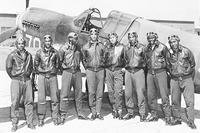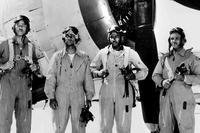Because of their groundbreaking service in World War II, the Tuskegee Airmen were awarded eight Purple Hearts, 14 Bronze Stars and 96 Distinguished Flying Crosses. Those distinctions would not have been possible without men like Archie Williams.
Williams, who won the 400-meter final at the same 1936 Berlin Olympics at which Jesse Owens collected four track-and-field gold medals, always wanted to be a military pilot but was disqualified from flight training because he exceeded the age limit. He ended up entering the Army Air Corps in 1942 when he was 27 years old instead, becoming part of the Tuskegee Weather Detachment -- the first group of Black meteorologists in America who assisted the historic airmen as they undertook dangerous missions over Europe and Africa.
"I used to go up and fly around and see how the weather was, call back and say, 'It's OK to fly,'" Williams recalled. "... It was fun. It was great because I was doing what I liked to do."

Williams, who died in 1993 at the age of 78, graduated from the University of California at Berkeley in 1939 with a mechanical engineering degree. Despite his academic achievements, Williams, as a Black man searching for viable employment in the first half of the 20th century, tried vainly to secure work in his chosen field, once even resorting to digging ditches and pulling weeds.
His fortunes changed when he accepted a position as a maintenance technician at Oakland Airport. In return, he received flying lessons, a skill that led him to becoming a civilian flying instructor at the Tuskegee Army Flying School in September 1941, teaching not only some of the first Tuskegee Airmen but civilian pilots as well. The following year, he enlisted in the Army Air Corps and found his way to the Tuskegee Weather Detachment as it urgently sought suitable candidates.
When the detachment was established in March 1942, there were few, if any, Black meteorologists, either in the U.S. military or anywhere else in the country. They had to be trained, with an engineering or similar degree and previous studies in math and physics required for eligibility to the Meteorology Aviation Cadet Program.

With his background, Williams qualified and was sent to UCLA to study in the program, and after graduating in September 1943, he was commissioned and returned to Tuskegee. Williams -- one of the last Black weather officers assigned to the detachment -- and his meteorological brethren served with the 332nd Fighter Group and 477th Bombardment Group, holding briefings and composing maps that detailed weather data en route to and at the Tuskegee Airmen's targeted locations overseas.
Those forecasts proved instrumental as the Tuskegee Airmen flew missions for the 12th Air Force before being reassigned to the 15th Air Force to escort heavy bombers in the summer of 1944. Along the way, overt discrimination followed the airmen.
"They said that the jump from the plow to the plane is too much [for Blacks]," Williams said. "We were supposed to fail. They expected us to fail."
They were wrong. The Tuskegee Airmen, who flew more than 15,000 sorties and destroyed more than 400 enemy aircraft during WWII, completed 179 escort missions from June 1944 through April 1945 and lost bombers to enemy fire on only seven of those, research by Air Force historian Dan Haulman showed. They also lost fewer bombers overall than the average of the other fighter groups in the 15th Air Force.
While nearly a thousand pilots were trained at Tuskegee from 1941 through 1946, the weather detachment was composed of just 15 airmen. Other Black officers served with segregated units in Kentucky, Indiana, Michigan and South Carolina during the war before President Harry Truman desegregated the military in 1948.
"Just as the Black pilots proved that they could fly military aircraft in combat as well as the white pilots, so did the Black weather personnel prove that they could perform meteorological functions as well as the white officers," Haulman said in a 2020 Washington Post article.
After serving in the Tuskegee Weather Detachment for about a year, Williams pivoted to teaching classes about flying and meteorology there. After World War II, he remained in the military and was assigned to the 20th Weather Squadron in Japan and flew B-29s in combat missions during the Korean War.
Williams retired as a lieutenant colonel in 1964 after stints as a weather detachment commander at various posts in the United States, ending an exemplary military career. The retired airmen went on to become a well-respected teacher, his impact felt to such an extent that a high school was named after him in the reckoning that followed the 2020 killing of George Floyd by police in Minneapolis.
Pushing Adolf Hitler's vision of Aryan superiority, Nazi propaganda once derided Williams and the other Black athletes on the 1936 U.S. Olympic team as "auxiliaries." The term did not apply then, and later on, the Tuskegee Weather Detachment didn't fill an auxiliary function, either.
As the meteorologists so ably showed, the Tuskegee Airmen wouldn't have been successful without them. In their own right, they were pioneers, too.
Want to Know More About the Military?
Be sure to get the latest news about the U.S. military, as well as critical info about how to join and all the benefits of service. Subscribe to Military.com and receive customized updates delivered straight to your inbox.





















